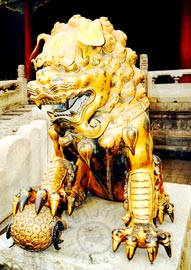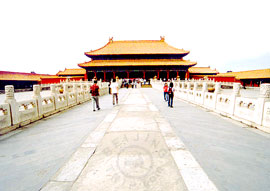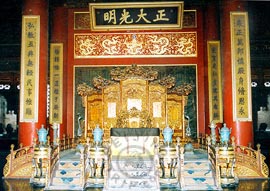 Gate of Heavenly Purity
Gate of Heavenly Purity
 The Gate of Heavenly Purity (Qianqing Men) separates the palace into the Outer and Inner Court. Behind the gate is the residential area of the palace. In front of the gate stands a pair of golden lions, a little smaller than those guarding the Gate of Supreme Harmony. The mighty lions, in the opinion of Chinese people, are extraordinary gate-guarders which frighten devils away. Beside the lions, ten huge golden vats are laid. These golden vats are not only garnitures but also hold water in case of fire. These vats weigh over 2,000 kilograms (4,409 pounds) and can hold more than 2,000 kilograms (4,409 pounds) of water.
The Gate of Heavenly Purity (Qianqing Men) separates the palace into the Outer and Inner Court. Behind the gate is the residential area of the palace. In front of the gate stands a pair of golden lions, a little smaller than those guarding the Gate of Supreme Harmony. The mighty lions, in the opinion of Chinese people, are extraordinary gate-guarders which frighten devils away. Beside the lions, ten huge golden vats are laid. These golden vats are not only garnitures but also hold water in case of fire. These vats weigh over 2,000 kilograms (4,409 pounds) and can hold more than 2,000 kilograms (4,409 pounds) of water.
During the Qing Dynasty (1644-1911), Emperor Kangxi, the second successor, began to hold court at this gate instead of the Gate of Supreme Harmony. Ministers used to gather outside the gate at dawn, report the state affairs to their emperor and await the emperor's decision. The Upper Study, in the east, was where princes studied in the Qing Dynasty. In the west, the smaller houses were the offices of the General Command Centre (Junji Chu), initially a military institution. Later the area saw the enaction of national decrees.
 Hall of Heavenly Purity
Hall of Heavenly Purity
 The Hall of Heavenly Purity (Qianqing Gong), twenty meters (65.6 feet) in height, is the largest hall in the Inner Court. Throughout the Ming Dynasty (1368-1644) and the earlier period of the Qing Dynasty (1644-1911), sixteen emperors lived in the hall. Emperor Yongzheng, the third emperor of the Qing Dynasty, moved to live in the Hall of Metal Cultivation. Hence, the hall was the place where emperors held council with his cabinet, interviewed his ministers and foreign ambassadors and read submitted documents. On festivals, family banquets and ceremonies took place in the hall. When the emperor died, his coffin was placed here for mourning for several days.
The Hall of Heavenly Purity (Qianqing Gong), twenty meters (65.6 feet) in height, is the largest hall in the Inner Court. Throughout the Ming Dynasty (1368-1644) and the earlier period of the Qing Dynasty (1644-1911), sixteen emperors lived in the hall. Emperor Yongzheng, the third emperor of the Qing Dynasty, moved to live in the Hall of Metal Cultivation. Hence, the hall was the place where emperors held council with his cabinet, interviewed his ministers and foreign ambassadors and read submitted documents. On festivals, family banquets and ceremonies took place in the hall. When the emperor died, his coffin was placed here for mourning for several days.
 At the center of the hall sits a golden throne which is surrounded by furnishings. The couplets on the columns exhort the emperor to show solicitude for their common people and to set a good example to others. Above the throne hangs a plaque with four Chinese characters on which means 'Aboveboard'. Behind the plaque, there was a small box which was used to store a will decreeing who would be the legal heir of the crown. To avoid the evils brought by princes' contesting for the throne, Emperor Yongzheng initiated secretly selecting the next emperor in this way. The reigning emperor wrote the will in duplicate, with one hidden by himself and the other put behind the plaque. After his death, the two copies were compared to check their authenticity and to announce the designated successor.
At the center of the hall sits a golden throne which is surrounded by furnishings. The couplets on the columns exhort the emperor to show solicitude for their common people and to set a good example to others. Above the throne hangs a plaque with four Chinese characters on which means 'Aboveboard'. Behind the plaque, there was a small box which was used to store a will decreeing who would be the legal heir of the crown. To avoid the evils brought by princes' contesting for the throne, Emperor Yongzheng initiated secretly selecting the next emperor in this way. The reigning emperor wrote the will in duplicate, with one hidden by himself and the other put behind the plaque. After his death, the two copies were compared to check their authenticity and to announce the designated successor.
 Go to the Next Attractions: Hall of Union and Peace & Hall of Earthly Tranquility
Go to the Next Attractions: Hall of Union and Peace & Hall of Earthly Tranquility